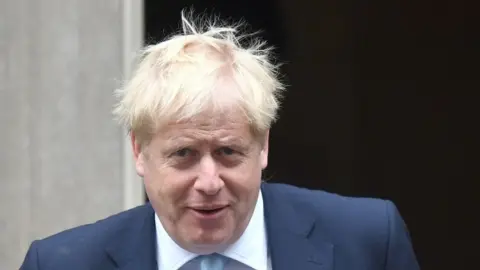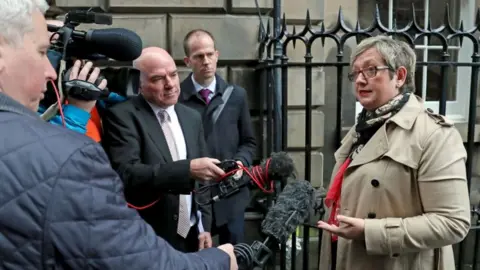Brexit: Boris Johnson will send extension letter - court document
 PA Media
PA MediaBoris Johnson will send a letter to the EU asking for a Brexit delay if no deal is agreed by 19 October, according to government papers submitted to a Scottish court.
The document was revealed as campaigners sought a ruling forcing the PM to comply with the law.
Their QC said it contradicted statements by Mr Johnson in Parliament.
But the prime minister said the UK would still be leaving on 31 October, deal or no deal, "but no delay".
Talks between the two sides aimed at resolving differences over the Irish border will resume on Monday, with the UK urging the EU "to work with us at pace to agree a new deal".
The so-called Benn Act - named after Labour MP Hilary Benn who spearheaded its passage into law - requires the government to request an extension to the 31 October Brexit deadline if a deal has not been signed off by Parliament by 19 October.
A senior Downing Street source said: "The government will comply with the Benn Act, which only imposes a very specific narrow duty concerning Parliament's letter requesting a delay - drafted by an unknown subset of MPs and pro-EU campaigners - and which can be interpreted in different ways.
"But the government is not prevented by the Act from doing other things that cause no delay, including other communications, private and public.
"People will have to wait to see how this is reconciled. The government is making its true position on delay known privately in Europe and this will become public soon."
Any extension to the Article 50 process - the mechanism taking the UK out of the EU - would have to be agreed by all 27 other EU leaders.
Mr Johnson has said he would rather be "dead in a ditch" than ask for a delay. In a tweet on Friday afternoon, he said: "New deal or no deal - but no delay."
The European Commission said its position that the UK's proposed new deal did "not provide a basis for concluding an agreement" had not changed after a day of talks with UK officials, but discussions would continue on Monday.

Analysis
By BBC Political Correspondent Jessica Parker
So there it is. In black and white. An undertaking that the prime minister accepts something that he has never publicly accepted before.
That if Parliament hasn't approved a deal - or given the nod to no-deal - by 19 October, he will have to send a letter asking for an extension.
Ministers have previously said that they will abide by the Benn Act but also "test" it, leading to speculation that they were hunting for a loophole.
But don't imagine that today's news means Number 10 has given up on sticking to its 31 October deadline, deal or no deal.
In fact, some will suspect that the document submitted to the Court of Session is simply a way of discouraging the court from issuing an order that could have handed the power, of writing that letter, to someone else; a court clerk or the Cabinet Secretary.
And Downing Street is hardly trying to stymie the suspicion that they have something else up their sleeve.
The question is what?
It's a question everyone in Westminster is asking.

The Scottish legal action has been initiated by businessman Dale Vince, QC Jo Maugham and SNP MP Joanna Cherry.
They want the Court of Session, Scotland's highest court, to rule on the extent to which Mr Johnson is bound by the Benn Act.
Speaking outside the court in Edinburgh, Mr Maugham said: "Our concern has always been that this is not a prime minister who can be trusted.
"He is making contradictory statements and we do not trust that he will do what he has said to the court he will do. So we want to make the court to make orders obliging him to do it, and if he doesn't then do it then he will face personal criminal consequences."
Steve Baker, chairman of the European Research Group of Brexiteer Conservative MPs, said the government document changed nothing.
"All this means is that government will obey the law. It does not mean we will extend. It does not mean we will stay in the EU beyond 31 October. We will leave."
 PA Media
PA MediaBut Brexit Party leader Nigel Farage said: "Boris said we would leave by October 31st 'do or die'.
"Why does he keep saying things that are not true?"
And anti-Brexit former Tory MP Anna Soubry, leader of the Independent Group for Change, said: "I just think this is further evidence that you can't trust a single word that this prime minister says."
Irish Prime Minister Leo Varadkar said he did not want to "comment on court cases that are happening in the UK. They'll play themselves out".
He told a press conference in Denmark the EU would consider a request for a further Brexit extension if Mr Johnson asked for one, adding: "Certainly an extension would be better than a no deal".
However, he said many other EU countries would need a "good reason" to approve a further delay to the UK's exit.
He said his preference was to reach a deal with the UK by the summit of European leaders on 17 October and said he believed this was still possible.
"Our focus is getting a deal at the EU Council and I believe that's possible," he added.
